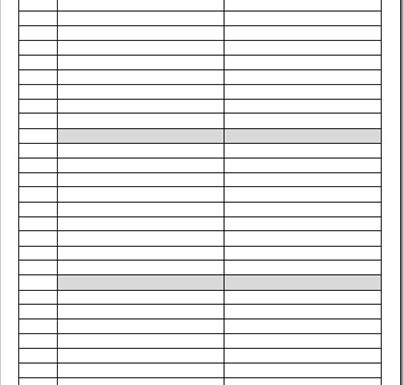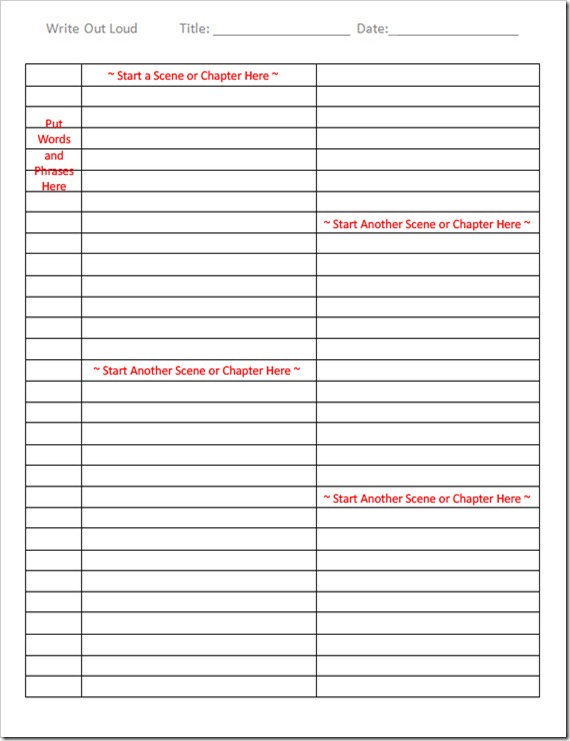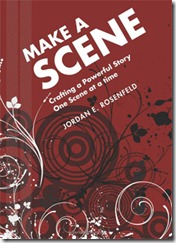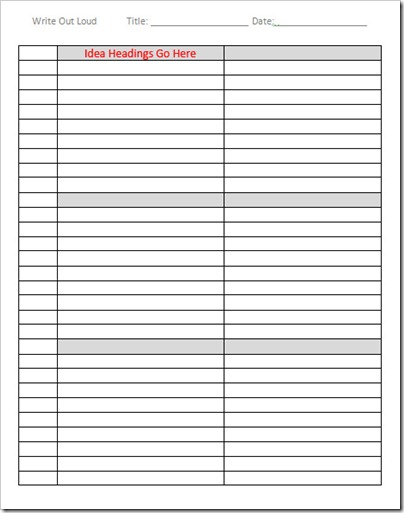Writing is hard. Writing takes mental energy. Writing causes the brain to put up its defenses and try and shut you down. Instead of facing writing and the brain head on, I’ve found it easier to take a different approach. When I’ve sat down at my computer and tried to start writing my brain circuits would instantly overload, causing what is know in writer’s circles as Writer’s Block. To get around this horrendous malady, I’ve discovered three things…
- Paper works better than a computer
- Writing in small chunks is better than a head on approach
- Writing what comes to mind is better than trying to write in order.
Over the past couple of months I’ve been working on a new fiction book. Through some trial and error I’ve developed a simple tool to get me writing quickly. It works much better than staring at a laptop screen for minutes or hours on end. I call it writing out loud.
Write Out Loud
Here is how it works…
I divide a sheet of paper into three columns…
I have a narrow column on the left for words, phrases and quick notes, and the rest of the page is divided into two writing columns. This is what it looks like…
I start writing words and phrases for ideas or key concepts in the left column. I write them as they come to me. In the two main columns, I’ll start writing scenes or chapters for my book. Sometimes, I’ll start at the top left, sometimes the top right. I just start writing. The narrow columns facilitate better reading and it’s easier to write this way too. Usually I’ll end up with three or four minor scenes per page.
I write till my mind gets tired, usually 45 minutes to an hour. As I’m writing, I’ll exaggerate punctuation, draw small pictures, and just have fun. At this point it’s cool just to get ideas and conversations on paper. Page after page I write. Editing will come later, when I transfer this text to the computer.
If I get stuck, I just get up and walk around for a few minutes. This usually gets the creativity flowing, and I’ll sit back down and add to what I have or create a new scene.
For more information about writing scenes, check out Jordan Rosenfeld’s masterful book, Make a Scene: Crafting a Powerful Story One Scene at a Time
When I’m done, I store my papers in a notebook. After compiling a few pages, I’ll set aside some time to transfer them to MS Word on my laptop. This is where the initial editing comes in. I clean up a lot of mistakes in the transfer process. When transferring my writing, I may move scenes around and try different approaches. That’s the fun of writing on paper. You have a LOT of flexibility to modify, change, exaggerate, and move things all over the place. It’s a blast.
When I’m brainstorming ideas for the book, I’ve found that I like a little more structure. I’ve taken the same sheet but added shaded boxes for headings. This allows me to capture six ideas per page. Simple but effective.
If you would like to try this system, I’ve put together two simple templates in PDF format. One has blank columns and the other has six shaded boxes. Why not download them and give them a try. You may find that your mind loosens up and some amazing words start to flow…
Free Download: Writing Out Loud Worksheet
Free Download: Writing Out Loud Worksheet With Shading
Question: What Will You Write Today?





